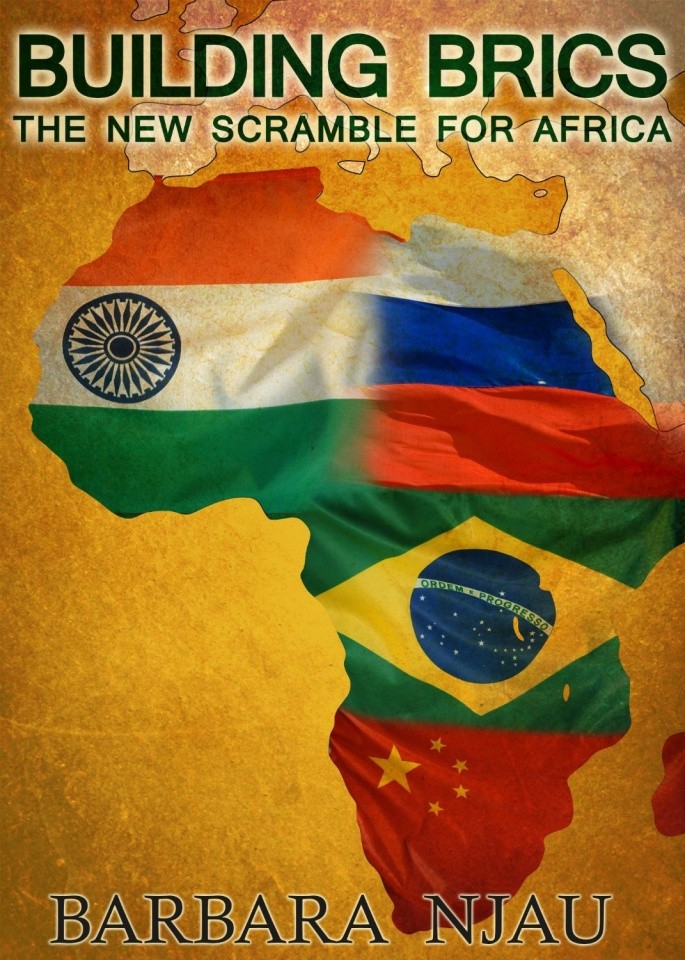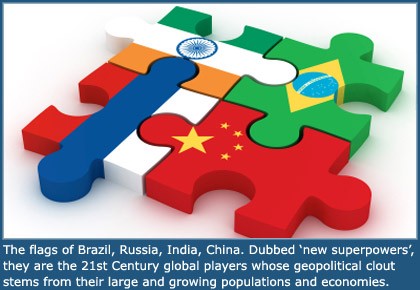Building BRICs
Post on: 21 Август, 2015 No Comment

With the G-8 summit taking place, there is some talk that the U.S. dollar could be replaced as a reserve currency by a “competing” currency from Brazil, Russia, India or China (known collectively as the BRICs). These countries have large economies and are outgrowing their emerging-market status. So what happens if the dollar is no longer the top dog?
Before your heart starts palpitating, take a moment to breathe. Most investment advisers and foreign-exchange traders think this change is unlikely to happen soon, if at all. Dr. Robert Barbera, chief economist at Investment Technology Group. says cold fusion is likely to happen before the BRICs take over the world reserve. With China’s renminbi pegged to the dollar, it’s an unlikely candidate to replace our currency for logistical reasons, he says. “An emerging, conflicted country’s currency shouldn’t replace ours.”
Even if the dollar isn’t replaced by a BRIC currency, that doesn’t mean that the dollar couldn’t be swapped out for something else. By having the dollar as the world reserve, we have the luxury of borrowing in our own currency, Barbera says, adding that we can always print more dollars, while a country like Norway doesn’t have the option of influencing the money supply. But by having the world reserve’s currency, U.S. monetary policy is also compromised by other countries trying to pull the U.S. dollar toward their own currencies.
Follow Intelligent Investing on Twitter
Sign up for the Weekly Intelligent Investing Newsletter
John Kicklighter, currency strategist at Forex Capital Markets, notes that the world reserve status puts the U.S. in the middle of the trading world. But there are also advantages to not being in the spotlight, including taking pressure off the U.S. from a political standpoint.
For those looking for trading opportunities based on a possible currency takeover, Kicklighter encourages investors to think of this as a long-term scenario. Focus on each economy’s financial health and relative growth pace when choosing FX pairs, he says. Two of the strongest currencies, according to Kicklighter, are the Australian and Canadian dollars. Australia’s dollar is strong because it is dependent on trading with China; China’s economy has been doing relatively well.
China has the fourth-largest economy in the world, according to Emerginvest, and it has sustained an average economic growth of about 9.5% over the past 26 years. Its gross domestic product in 2007 was about $3.21 trillion, according to the World Bank. Russia’s GDP was $1.29 trillion that year, Brazil’s was at $1.31 trillion and India’s at $1.18 trillion, according to the World Bank.
And for those who are worried that another currency is moving against the dollar, you can hedge, says Vlad Milev, investment strategist at Metzler Payden European Emerging Markets Fund. For example, a European-based investor would hedge with the euro, he explains.
There are also some exchange-traded funds that can be used for hedging, such as Currency Shares Euro Trust ETF and iPath Optimized Currency Carry Exchange-Traded Note for the Euro. Another ETF for the U.S. dollar is the PowerShares DB U.S. Dollar Index Bearish.
A BRIC takeover is also unlikely from a logistical standpoint, as there are four currencies involved–the Chinese renminbi, the Brazilian real, the Russian ruble and the Indian rupee, says Uri Landesman, head of global strategies at ING Investment Management. Though these countries could possibly create a common currency, similar to the euro, it wouldn’t be easy.
A possible BRIC replacement for the dollar has more to do with a political and economic power struggle than with getting a stronger currency as the world reserve. “[The BRICs] ‘have to’ if they want to be able to exert their desire to be taken more seriously and seen as real economic powerhouses on the world’s economic stage,” says Stephen Roseman, manager at Thesis Capital.
This change is unlikely to happen particularly because the BRICs aren’t economically fit enough to handle being the world reserve, Roseman notes. “At the end of the day, whether or not people agree with U.S. economic policy, we are still the best house in a bad neighborhood–relatively speaking, of course.”
“It’s not an issue of common sense but simply the likely need for BRIC [nations] to flex some muscle on the world scene,” says Bill Singer, shareholder at Stark & Stark law firm. If BRICs starts to talk about replacing the dollar, there could be a major re-pricing of commodities as investors lost confidence in the dollar, he explains.
Some, however, are more convinced that a BRIC takeover is possible. Since China has been lending the U.S. a lot of its stimulus money, the renminbi could be a logical replacement for the dollar at some point, notes Andrew Waterman, chief executive of Emerginvest. But he adds that a collective basket of currencies, including the euro, British pound and Japanese yen, are more likely to replace the dollar.
Building BRICs
Forbes: Will or should the BRICs seek to replace the dollar as a reserve currency? And if they do, how should retail-level folks profit from this, if they can? And if they don’t, does that mean we should buy ETFs that track the dollar?
Bill Singer: My answer is a bit odd because it seems to start in one direction but ends up in another.
First off, yes, I think BRIC should seek to replace the U.S. dollar as the world’s reserve currency. I think that it is probably the “manifest destiny” of BRIC–to borrow from an old American historical term–to seek to challenge [the] dominance of the United States and, as such, attempting to undermine our influence by curtailing the U.S. dollar’s reserve status would seem a logical step for that four-nation economic front.
It’s not an issue of common sense but simply the likely need for BRIC to flex some muscle on the world scene. Additionally, the catastrophic fiscal management by the recent Bush administration coupled with the overall failure by the Democratic Party and the Republican Party to embrace fiscally sound governance has weakened our economy to the point where the “Almighty Dollar” just ain’t looking so almighty anymore. Sadly, I just don’t see much in the near future to suggest that we will soon return to our now faded economic glory–and I’m not sure if we will ever return to that ledge.
Now for the “however.”

However, as one of my favorite quotes–from George Bernard Shaw, a socialist no less–warns: “The two great tragedies in life are not getting your heart’s desire and getting your heart’s desire.” I doubt that the BRIC policy planners fully appreciate the wisdom of that quote.
In attempting to replace the U.S. dollar, BRIC will likely act as all such amalgams do: in a clumsy manner. Just as a camel is said to be “a horse created by a committee,” I am sure that the proposed new reserve currency will be replete with humps and a nasty tendency to spit–it will not be a thoroughbred.
Just imagine how an authoritarian nation such as Russia will work with a doctrinaire old-line Communist nation such as China and then with such a fractious democracy as India coupled with the free-for-all that is Brazil. I can’t wait to see what emerges from such an Asian-European-Latin American consensus.
More challenging is how BRIC will replace the U.S. dollar without debasing the significant dollar reserves and dollar-denominated investments of those countries–and without harming the still delicate U.S. economy–and without hammering the many futures markets that are based upon common U.S. dollar pricing.
My guess is that by the time BRIC agrees on some replacement currency that the world may come to miss the “ugly American” and will realize that for our many faults we still filled many streets with our free-spending tourists and bought many local goods for our spendthrift households. I see little evidence that China, Russia, India and Brazil are prepared to step into those now-gaping breaches. What I do see in today’s paper are ethnic riots in China, ongoing jockeying between Medvedev and Putin and troubling clashes between Muslim and Hindu Indian factions. Brazil? Well, for now it seems relatively calm.
The challenge for BRIC is to reproduce the once solid stability of the U.S. dollar and not to emulate the relatively tarnished euro. I suspect that the major challenge for BRIC is [the question of] on what standard to base the BRIC. I would love to sit in on that debate. A gold standard? A petro standard? Anyone willing to let the Chinese peg the new currency? … And for once, perhaps the U.S. will sit quietly on the sidelines and have some smug satisfaction that, as bad as the world might have seen us, the new order may be far worse. Only time will tell.
Stephen Roseman: The BRIC countries will likely pursue the replacement of the dollar as the reserve currency. They have to if they want to be able to exert their desire to be taken more seriously and seen as real economic powerhouses on the world’s economic stage. The question is whether or not they will be successful. The likelihood is that they won’t. This is largely because of structural economic and/or political deficiencies in the BRIC countries. At the end of the day, whether or not people agree with U.S. economic policy, we are still the best house in a bad neighborhood–relatively speaking, of course.
Retail investors will likely have difficulty in directly profiting from the likelihood of this happening (or not), as it is difficult to handicap the outcome, it’s long-term in nature, diffuse in effect and affects each part of their portfolios differently.
Bill Singer: As to what this all means for retail investors, probably not much–or at least not too much that they should be trading on. If BRIC starts to make noise about replacing the U.S. dollar, it will likely send sizable shockwaves through the equities, debt and futures markets–which I suspect is the fly in the ointment. This is akin to pulling the proverbial loose thread on the knit sweater.
My guess is that we will likely see a major re-pricing of commodities as the world’s investors lose confidence in the sanctity of the dollar but will also have troubling concerns about whatever is proposed to replace–particularly a reserve currency that will be propped up by such question marks as Putin’s Russia and Communist China.
See More Intelligent Investing Features














